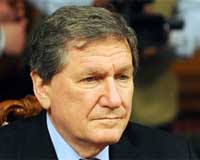| . |  |
. |
New Delhi (AFP) Dec 15, 2010 Chinese Premier Wen Jiabao arrived in India at the head of a huge business delegation Wednesday to try and shore up a relationship undermined by persistent trade and territorial disputes. Hundreds of Tibetan exiles protesting Chinese rule over their homeland marched through the streets of New Delhi ahead of Wen's visit, his first to India in five years. Wen and his Indian counterpart Manmohan Singh have both stated that the world is "large enough" to accommodate the growth and ambition of the two Asian giants, but ties are dogged by a history of mutual suspicion and mistrust. Growing competition for global markets and the raw materials needed to keep their fast-growing economies on the move has exacerbated tensions over border disputes, trade and the activities in India of Tibet's exiled spiritual leader, the Dalai Lama. Wen's visit comes at a point when Beijing's relations with Delhi are -- in the words of China's ambassador to India, Zhang Yan -- "very fragile, easy to damage and difficult to repair". Wen, the latest world leader to beat a path to India's door, was accompanied by 400 Chinese business leaders, outnumbering the recent delegations headed by US President Barack Obama and French President Nicolas Sarkozy. Despite the numerous diplomatic thorns in the relationship, economic ties are booming, with bilateral trade set to reach 60 billion dollars this fiscal year, up from 42 billion dollars the year before. "Let trade do the talking," the Hindustan Times said in an editorial ahead of Wen's arrival. "Other issues that add to the trust deficit will hopefully get addressed on the way." But even trade ties are the subject of some friction, with India demanding greater access to Chinese pharmaceutical and IT markets as it seeks to redress a yawning trade surplus in China's favour of between 18 and 25 billion dollars. Talks between Wen and Singh on Thursday are certain to touch on the two countries' disputed Himalayan border -- the cause of a brief but bloody war in 1962 and the focus of 14 rounds of largely fruitless negotiations. China has become increasingly assertive on the territorial issue and complained bitterly last year over visits to the northeast state of Arunachal Pradesh -- which China claims in full -- by Prime Minister Singh and the Dalai Lama. The Dalai Lama, regarded as a dangerous separatist by Beijing, has lived in exile in India since fleeing a failed 1959 uprising against the Chinese. The Tibetan Youth Congress, which organised Wednesday's protests in Delhi, said it wanted to highlight the "extremely critical" situation of political prisoners in Tibet. "History shows that occupation and oppression never lasts forever and until that day comes and to hasten the arrival of that day, we will keep our fight alive," the group said in a statement. Wen, who is due to address a business summit on Wednesday afternoon, will follow his visit with a trip to India's arch-rival Pakistan, whose close ties with Beijing have always been viewed with suspicion from New Delhi. Other irritants include Beijing's lukewarm response to India's push for a permanent seat on the UN Security Council, and New Delhi's concerns that a Chinese dam on the Brahmaputra river in Tibet could disrupt water supplies downstream in India and harm ecosystems. Harsh V. Pant, a lecturer in the Department of Defence Studies at King's College London, said tensions were inevitable in a relationship that will help define the balance of global power in the 21st century. "A troubled history, coupled with the structural uncertainties engendered by their simultaneous rise, is propelling the two Asian giants into a trajectory that they might find rather difficult to navigate in the coming years," Pant said.
Share This Article With Planet Earth
Related Links Learn about the Superpowers of the 21st Century at SpaceWar.com Learn about nuclear weapons doctrine and defense at SpaceWar.com
 Veteran US Diplomat Richard Holbrooke Dies
Veteran US Diplomat Richard Holbrooke DiesWashington DC (AFP) Dec 14, 2010 Richard Holbrooke, the US special envoy for Afghanistan and Pakistan and a key figure in the 1995 peace agreement that ended three years of war in Bosnia, died Monday from a heart ailment, media reported. Holbrooke, 69, died after undergoing surgery for a torn aorta at a Washington hospital. He fell ill on Friday while working at the State ... read more |
|
| The content herein, unless otherwise known to be public domain, are Copyright 1995-2010 - SpaceDaily. AFP and UPI Wire Stories are copyright Agence France-Presse and United Press International. ESA Portal Reports are copyright European Space Agency. All NASA sourced material is public domain. Additional copyrights may apply in whole or part to other bona fide parties. Advertising does not imply endorsement,agreement or approval of any opinions, statements or information provided by SpaceDaily on any Web page published or hosted by SpaceDaily. Privacy Statement |